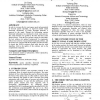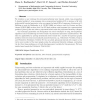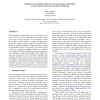520 search results - page 27 / 104 » New Complexity Results for Classical Planning Benchmarks |
BMCBI
2008
13 years 7 months ago
2008
Background: Reliable prediction of antibody, or B-cell, epitopes remains challenging yet highly desirable for the design of vaccines and immunodiagnostics. A correlation between a...
GECCO
2005
Springer
14 years 28 days ago
2005
Springer
In order to overcome the low convergence speed and prematurity of classical genetic algorithm, an improved method named directional self-learning of genetic algorithm (DSLGA) is p...
CORR
2010
Springer
13 years 4 months ago
2010
Springer
We introduce a new technique for proving kernelization lower bounds, called cross-composition. A classical problem L cross-composes into a parameterized problem Q if an instance o...
CORR
2010
Springer
13 years 7 months ago
2010
Springer
During the last decade, incremental sampling-based motion planning algorithms, such as the Rapidly-exploring Random Trees (RRTs), have been shown to work well in practice and to po...
WSC
2008
13 years 9 months ago
2008
Understanding how the structure of a network evolves over time is one of the most interesting and complex topics in the field of social networks. In our attempt to model the dynam...



